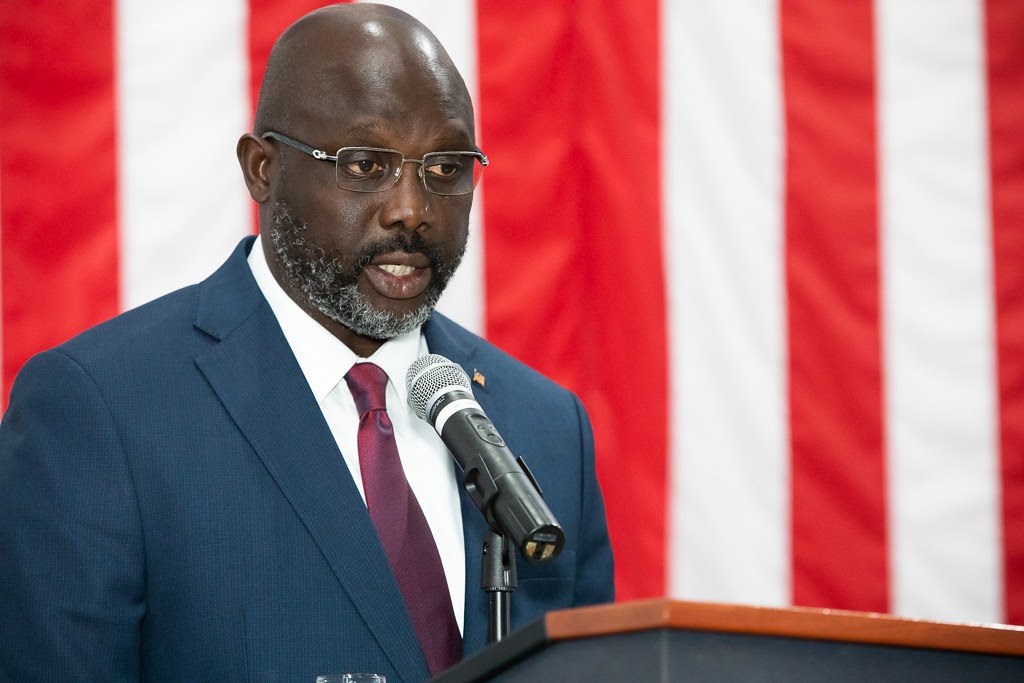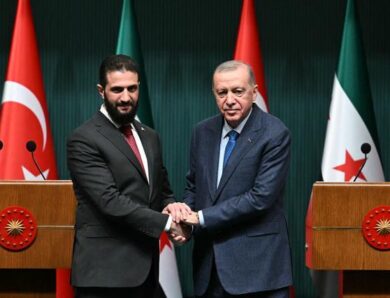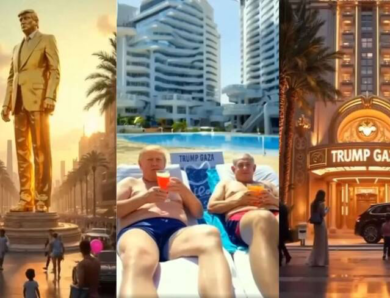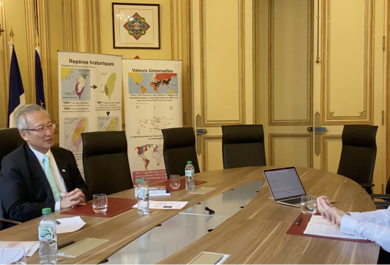
George Weah and Liberia – fighting (for) corruption and democracy?
“Football is a simple game. Twenty-two men chase a ball for 90 minutes and at the end…” you become president of Liberia. Yes, the Germans usually win, but this is not what George Weah took from Gary Lineker’s famous quote. The 1990’s football superstar is now Liberia’s second democratically elected head of State (after the wars), an incredibly hard position to hold in one of Africa’s most war-torn countries. His election in 2017 was stamped by the want for a renewed democracy in a country ravaged by civil wars, political coups, poverty and corruption.
Anti-corruption measures, salvaging the economy, stabilising the hard-fought democratic features of the regime – what is left of Weah’s presidential promises? After two years in power, what can be said of the reforms the Liberian people expected? To appraise this football player’s presidential actions and promises, one first has to have a quick overview of the recent Liberian history. Second, it is necessary to put in perspective Weah’s character and then analyse his promises as such. Afterwards, one may try to assess his results as head of State.
A brief look back on Liberia’s past

Liberia is a small country in West Africa, bordering Sierra Leone, Guinea and the Ivory Coast. Founded by freed American slaves, Liberia is known to be – along with Ethiopia – the only African country which has not been colonised by European powers. Nonetheless, from 1822 until 1951, Liberia was not known for its democratic features, denying de jure voting rights to anyone that was not a descendant of these American freemen (which ethnic group is known as the Congo). But even the democratic leap of 1951 did not break down the complicated structures of the Liberian state. Indeed, it was governed from Monrovia by an Americo-Liberian elite, using a combination of force and corruption to incorporate local chiefs in the nascent state structures, reinforcing a sense of ethnic belonging in local – and essentially rural – communities. This imbrication of power structures and ethnic differences shaped Liberian politics and turned them into struggles for power on multiple scales where no one could be the winner.
However, the near-authoritative dominance of the Americo-Liberians was put to an end in 1980 when its president was assassinated by a group of officers led by Samuel Doe – of Krahn origin – and its government overthrown. Just as corrupt as the previous regime, only now with a subtle hint of open ethnic violence, Doe’s rule would be quickly threatened by attempted coups, the last one of which saw the crossing of two rebel armies led by Charles Taylor and Prince Johnson from the Ivory Coast. This open rebellion launched a decade-long civil war in Liberia, a civil war with major ethnic characteristics on every side of the war. Although Doe would come to be murdered in 1990, the war would continue to rage on under Taylor’s thuggish administration, burning schools and hospitals to the ground, butchering, mutilating, and raping thousands of Liberians.
The civil war eventually came to an end in 2003, not without international help. More than 250.000 people have died during these civil wars, wars that continually opposed ethnic groups and rural communities, permanently preventing any national unity to be built. Nonetheless, democracy was to be achieved, if not for its essential characteristics but for peace to be preserved. Ellen Johnson Sirleaf was thus freely elected as first Liberian president in 2005.

Ellen Johnson Sirleaf’s complicated presidency
For a long time one of the most powerful and admired African woman, Nobel Peace prize co-laureate in 2011, Johnson Sirleaf embodied everything Liberia could have hoped for after years of struggling, misery and chaos. How can one do poorly in such a devastated country? Indeed, assessing such a presidency with our western standards of performance may very well be pointless.
However, what remains noteworthy in these twelve years in power, is the very nature of her terms, her anti-corruption and pro-democracy stance. And to this extent, it is hard not to remember the figures of her re-election in 2011. Although, once again, every bit of data in such war-torn and traumatised region is to be handled with care, the astonishingly low 36.8% participation rate inevitably challenges what seemed first-hand like an unquestionable legitimacy. Moreover, this long-time African activist has also been accused of nepotism, as her two sons held major positions in her administration. But this is the least important of the charges that can be held against her presidency and her political journey. Indeed, she is also known to have had close ties to former warlords Charles Taylor and Prince Johnson.
Who are these two personae? Charles Taylor, president from 1997 until 2003, is a publicly acknowledged war criminal, not only on Liberian soil but mainly for his involvement in the civil war in neighbouring Sierra Leone, convicted in 2012 for aiding and abetting a warring organisation, for crimes against humanity, murder, forced labour, slavery, recruiting child soldiers and, last but not least, rape. Johnson Sirleaf is publicly known to have financially supported this charming man’s war efforts against Samuel Doe’s brutal dictatorship. And as for Prince Johnson, he is widely known for his incredibly cynical and atrocious torture and execution of Samuel Doe – where he was filmed peacefully sipping beer from a can while his men were cutting Doe’s ear off – but also for his war crimes, turning an entire generation of Liberians into soldiers, and to whom Johnson Sirleaf is known to have given several large sums of money in obscure contexts.
It is hard to paint the picture of a good-hearted and benevolent Ma Ellen when associations with these two characters are public knowledge. This is even more so when you find out that Prince Johnson, after a detour in Nigeria during Taylor’s presidential term when he said to have become a born-again Christian, thus cleansing his past sins he does not even try to refute, is now a Senator with an attempted run at presidency in 2011.
Nonetheless, despite these affiliations casting a large shadow on Ellen Johnson Sirleaf’s political integrity, it must be reminded that her presidency was also devoted to fighting the pervasive rape culture, to consolidating the judicial system and to preserving peace, ambitious measures she mostly held true.
Before Weah’s arrival at the Executive Mansion in Monrovia – the presidential building, where dozens of murders are known to have taken place between 1980 and 2003 – Liberia was struck by another crisis that needs to be taken into account when looking at his first years in power. The Ebola outbreak in West Africa between 2014 and 2016 gravely impacted every aspect of life in Liberia, far beyond our political prospection. Massively contagious, with a 50% average mortality rate, ranging from 25% to 90% in the various outbreaks since 1976, this haemorrhagic fever hit Liberia’s population for everything it had recovered in just over a decade. Here come a few sentences that may ring a bell to some during this spring 2020: facilities and medical staff over the country were widely unprepared, unmanned, untrained. The dearth of equipment was so tragic that the disease spread to everyone remotely involved with the first few cases. Curfews, movement restrictions, closing of markets – Johnson Sirleaf was obligated to declare the state of emergency and to call on the military to enforce these measures. With the help of the World Health Organisation, the Liberians were nonetheless able to fight back and flatten the damned curve. At the end of this sanitary crisis, Liberia reported 4.810 deaths for a total count of 10.678 cases reported to the WHO. But the virus also killed 8% of Liberia’s doctors, nurses and midwives. And as is the case with any virulent virus – a Wuhan-born and raised friend of mine comes to mind – it has also dire consequences for any other diseases that cannot be treated with the same rigour during a deadly outbreak. More than 10.000 additional people are supposed to have died of either tuberculosis, HIV or malaria in Liberia, Sierra Leone and Guinea during these few months.
Let us turn back time one last time, shall we?
Poverty, success and politics – the life of George Weah
George Manneh Oppong Weah was born in 1966 in one of the very poor neighbourhoods of Monrovia. Typical boy of the ghetto, Weah was raised in the streets of Clara Town, playing football for the next-door town club, the Young Survivors. It is this activity that started what would become the most successful individual career for an African football player. As he was making his way through the different leagues in Liberia, the Ivory Coast and then Cameroon, Weah was eventually spotted by Arsène Wenger who then worked for Monaco’s football club. Thus, in 1988 started Weah’s European career, a career that would very rapidly come into the spotlight. From his position in Monaco, Weah successfully transferred to other clubs – PSG, AC Milan, Chelsea – where he won a significant number of trophies and was widely acclaimed as one of the best strikers of his time. This extraordinary path was crowned in 1995 when George Weah became the 1st African athlete to win the Ballon d’Or, the highest individual award for a professional football player. To this day, he is the only African sportsman to have ever received this honour.

Thus from 1988 to 2003 – when Weah decided to put an end to his career in football – the one that was now known as Mister George had been an outsider to the violence and the conflicts that had taken place in his native land. Although he never remained totally silent, Weah was de facto estranged from the political mayhem in Liberia, a feature that has allowed him to be portrayed – by some – as the only non-corrupt politician in the run.
However, Weah’s political career did not take long to launch as the former athlete founded his party – the Congress for Democratic Change (CDC) – in 2004 to be able to run for presidency as early as possible. And indeed, Weah managed to launch a presidential campaign against Ellen Johnson Sirleaf for the crucial 2005 elections we’ve previously discussed. Although one may think Mister George would have had little chance to beat Ma Ellen, both because of her indubitable popularity at the time and because of his relative inexperience in political management, Weah still managed to face her in the run-off election, even finishing in first position at the first round with 28.3% of votes, nearly 10% more than his opponent! Nonetheless, despite what could be construed as a political prowess, Weah only received 40.6% of the votes at the run-off, and was thus, not after some complaining and demanding of a re-run, forced to stand down and let Johnson Sirleaf tackle the issue of reconstruction.
It is during this time that Weah moved to the United States to fill this educational gap his opponents had been pointing out. The Liberian athlete thus studied for Business administration in Florida, returning to his homeland in 2009, already aiming for the 2011 presidential election. However, a series of internal disagreements and failed coalitions between parties amounted in what can only be described as a disappointing ticket for Weah. Winston Tubman was chosen by the CDC to be the presidential candidate against the still-very-popular Johnson Sirleaf, leaving only the less prestigious VP position to the former football player. In retrospect, this choice may still reflect the portrayal of an inexperienced Weah who would thus need to be partnered with a lifelong politician, Tubman having served in several administrations for decades, both abroad and in Liberia.
And yet, as we already know, Weah would have to wait some more before making his way to the Executive mansion. Finishing 2nd with 32.7% of the votes, only 11.2% behind Johnson Sirleaf, Weah’s ticket with Tubman was allowed once again to go for a run-off. However, after massive complaints directed towards Johnson Sirleaf, claiming her administration had rigged the election process, Tubman called for his supporters to boycott the 2nd turn, which caused the president to be re-elected with 90.7% of the suffrages, with an exceptionally low turnout (38.6%). Although this turnout could have been cause enough to discredit Sirleaf and launch another electoral process, nothing of the sort was decided. Peace and continuity in a country that still bore very fresh scars of civil violence were chosen over a constitutional challenge and democratic guarantees.
Biting the dust for the second time in 6 years, Weah’s ambition nonetheless never waned. Reconsidering his two political defeats, it seems that the most logical conclusion was that to seek the highest office in the land, one had to have occupied political office before trying out his luck again. Weah thus seized the opportunity and ran for senator in December 2014 in his home county, Montserrado. County of the capital, ambitious project? The results seem to disprove this theory as the former athlete won by a larger than large majority of 78%, beating every last one of his adversaries, not the smallest one of which was Ellen Johnson Sirleaf’s own son. By January 2015, Weah was now in office, although only a senatorial one, which put him in the best conditions possible for the following presidential election, even more so now that his opponent of long would not be able to run for a third term.

From presidential promises to presidential actions
In 2016, Weah was thus able to launch his decisive presidential campaign, the victorious one that would allow him to enter the Executive mansion and occupy it for 6 years. On December 26th, 2017, Mister George became Liberia’s 2nd 21st century Head of State with 61.5% of the intended suffrage, defeating his opponent Joseph Boakai, former Vice-President under Johnson Sirleaf’s twelve-year presidency. Although with a limited turnout – only 55.8% in the run-off election – this was a great success for Weah, crushing Sirleaf’s Unity Party in all but one county. However, such a landslide victory was only possible after yet another compromise from Weah’s team, forming a Coalition for Democratic Change with the Liberia People’s Democratic Party and the National Patriotic Party, the latter one of which is said to still be led by Charles Taylor to this day.
During his campaign and as he was sworn in, Weah’s motto was the fight against the rampant corruption in the country. Alongside this rather unsurprising promise, Mister George declared he would make education and healthcare free and accessible to all, open up new positions in the military sector to young citizens from a poor background, and sign new economic deals to attract foreign investments and boost the economy. To this end, Weah’s first official extra-African visit was to French President Emmanuel Macron. But the fight against corruption, the promise to put an end to money embezzlement by government and parliamentary officials was the key stance of his journey to power.
According to Transparency International’s Corruption Perceptions Index – a statistical tool that can only be used with precaution for it is undoubtedly far from perfect – Liberia ranked 122nd in 2017, with a score of 31. This rather unevocative number must be compared with the CPIs in 2005 and 2011 to try and get a glance at the evolution of corruption between presidential elections. Indeed, fresh out of civil war, Liberia ranked 137th with a score of 22, this result clearly improving during the first six years to reach an all-time highest of 32 (ranked 91st) in 2011. Although this set of obscure data may not be of pure scientific relevance, it allows us to put in perspective Weah’s first two years in power, as his country is now ranking 137th, losing 3 points in just two years.
After two years, Weah’s promises seem to have been either empty or too ambitious, except for the abolition of university tuition fees. Criticisms have now turned into protests over his apparent failure to tackle the thorny issue of corruption. Although he had immediately announced cutting his salary by 25% to show his will and determination to end the privileges of the bureaucratic ruling elite, not much else has been done since to effectively change the situation. If anything, choosing Charles Taylor’s ex-wife Jewel Taylor to be his Vice-President may have worsened his image with time. Moreover, scandals about alleged pay-out bonuses to legislators have even recently been uncovered in the national press.
Furthermore, upon election, Weah had promised some symbolic yet important amendments to the Constitution. Indeed, the Liberian Constitution – established in 1986 – states that only “people of colour” can be Liberian, that only they can own property in the country (you even have to own 25.000$ worth of property to run for presidency). Deemed “unnecessary, racist and inappropriate” (except for the last one of course), by Weah himself, these clauses are still to be amended.
On the economic front, the situation has barely changed for most Liberians, as more than 60% of the population still lives beneath the poverty line. Although the President had injected millions of dollars in the economy in July 2018 to thwart the inflation, he was forced to observe the inefficacy of such a measure, criticising the central bank’s officials and unscrutinised functioning. Reports of disappearing banknotes in the institution’s records has been perceived as an outrage by most Weah voters, several hundreds of them took it to the streets to show their discontent.
Lastly, as the COVID-19 pandemic is striking the entire planet, Weah’s presidential abilities have been challenged once again, the memory of the Ebola catastrophe very close in mind. Although African countries have, to this day, been significantly less affected by the virus, Liberia’s political elite has been struck, with several high-ranking officials tested positive in the last few days. With 7 counties touched, and only 211 officially reported cases as of May 13th, 2020, Liberia still seems to be rather preserved from the deadly pandemic. However, brutally aware of the potentially devastating consequences an exponential increase would have, Weah has rapidly asked – successfully – the Parliament to endorse his decision to declare a nationwide state of emergency, with the added ability to enforce draconian quarantine measures in affected counties.
As is the case with every other country afflicted by the virus’ dire consequences, George Weah’s Liberia may be looking at a very gloomy future, both for its people and its institutions. However, such prospect does not stop Mister George from inciting his citizens to respect sanitary guidelines through song, warning everyone that “it could be your mama, your papa, brother and sister, let’s stand together to fight this deadly disease now”.
Florian Mattern
Sources
Mike McGovern, “Rebuilding a Failed State: Liberia”, Development in Practice, 15/6 (2005), pp. 760-766.
Morten Boas & Mats Utas, “The Political Landscape of Postwar Liberia: Reflections on National Reconciliation and Elections”, Africa Today, 60/4 (2014), pp. 47-65.
https://www.jeuneafrique.com/mag/853352/politique/liberia-la-personnalite-de-george-weah-divise/
https://www.jeuneafrique.com/mag/853437/politique/liberia-lentourage-heteroclite-du-president-weah/
https://www.worldbank.org/en/country/liberia
http://mecometer.com/whats/liberia/gini-index/
http://www.hdr.undp.org/en/countries/profiles/LBR
https://www.theguardian.com/world/2011/oct/18/liberia-president-second-term-warlord
2019 Corruption Perceptions Index 2019 Transparency International
https://www.transparency.org/research/cpi/cpi_2005/0#results
https://www.cdc.gov/vhf/ebola/history/distribution-map.html
https://www.who.int/csr/disease/ebola/one-year-report/liberia/en/
https://www.cdc.gov/vhf/ebola/history/2014-2016-outbreak/case-counts.html
https://www.cdc.gov/vhf/ebola/history/2014-2016-outbreak/cost-of-ebola.html
https://www.who.int/news-room/fact-sheets/detail/ebola-virus-disease
http://www.rfi.fr/en/africa/20200325-liberia-president-weah-sings-for-covid-19-awareness
http://news.bbc.co.uk/2/hi/africa/4433844.stm
http://www.necliberia.org/results2011/
https://www.liberianobserver.com/news/whos-telling-the-truth-darius-dillon-or-prince-johnson/
https://www.liberianobserver.com/news/covid-19-infections-too-close-to-seat-of-power/
Liberia’s Constitution of 1986 available at www.constituteproject.org





No Comment